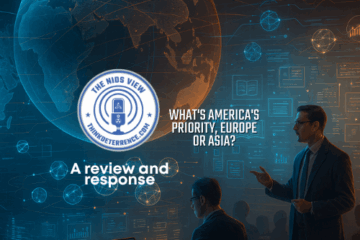For America to pragmatically solve the nuclear strategy three body problem—simultaneously deterring Russia, China, and North Korea—the United States must compensate for three characteristics of the international system: realpolitik, fake news, and sociopathic dictators. These, unfortunately for global peacekeeping, interact in a feedback loop, which forms a deadly three-player game of its own. In game theory, three-player games are notoriously difficult to analyze and sometimes the weakest player wins big.
Realpolitik, fake news, and sociopathic dictators are nothing new. They date back more than two millennia. In their time, the social mechanisms and technology of the day were employed. Ancient Rome’s Emperor Augustus is but one example. The word realpolitik, invented in Germany in the mid-nineteenth century, describes the application of diplomacy and force in the pursuit of selfish state interests. Count Otto von Bismarck, the “Iron Chancellor,” was another master of ruthless realpolitik.
Fake news is modern slang for purposeful disinformation spread as real news. Fake news makes claims that the maker knows to be false, but intentionally packages and distributes to seem genuine, to serve their political and military purposes. English-language fake news, used as wartime propaganda, was already commonplace by the time of the English Civil War (1642–1651). It also vexed the American founding fathers during the American Revolution (1775–1781).
Sociopathic dictators have a serious psychological disorder characterized by constant deceitful manipulation and a complete lack of regard for other people. When a very ambitious and successful sociopath rises to be head of state, taking control of national armies and arsenals and even nuclear weapons, the results can be devastating.
Infamous examples of twentieth-century dictators who practiced realpolitik, propagated fake news, and were sociopaths include Josef Stalin, Adolf Hitler, and Mao Zedong. Between them, their amoral aggression and complete disregard for lives caused the deaths of tens of millions.
Understanding these three historical and contemporary phenomena is essential for America to effectively address national security concerns. Acting together, realpolitik, fake news, and sociopathy shape adversary strategic behavior and work to the United States’ serious detriment. During the nuclear age and the social media era, the risks due to this “trinary weapon” skyrocketed.
Coping with these clear and present dangers calls for a nuanced and multidisciplinary, multiagency approach to deterrence and defense. This approach needs to go well beyond traditional military strategy that focuses on applying force while maintaining secrecy. Three lines of effort are important to help mitigate the above-mentioned trinary aspects of coercive statecraft.
First, multilateral engagement is important for combating the ill effects of enemy realpolitik. Just as in World War I, World War II, and the Cold War, collective international efforts by like-minded democracies are vital to resisting expansionist tyranny. Further strengthening multilateral frameworks and alliances, to address common security challenges and deter adversarial behavior, is a useful approach. Important examples include expanding NATO and rationalizing its burden sharing. Expanding AUKUS, a trilateral security partnership between Australia, the UK, and the US, to include Japan and other Asia-Pacific allies, such as South Korea and Canada, is another option.
Second, strategic communication and information resilience is important. These hybrid-warfare, offensive and defensive weapons need further development by the United States. Clear and consistent messaging is indispensable to effectively convey America’s values and goals and to counteract bad-actor manipulation. This can help immunize allies against falling for adversary disinformation and protect victims of repression from enemy brainwashing.
To this end, enhancing resilience against fake news requires expansion within the United States. This can be done using media literacy programs, non-partisan fact-checking mechanisms, and widespread public awareness campaigns. Any information warfare efforts the US employs to target adversary populations needs to meet high legal and ethical standards. It must also be tempered by stark realism about the utility of disinformation. In short, unconstrained free speech requires an informed public.
Third, psychological profiling techniques, now standard practice in law enforcement, need further development to identify and mitigate the influence of sociopathic dictators in shaping strategic events. Such hyper-threatening individuals could, perhaps, be identified mid-career, before rising to lead nations. Overt and covert efforts to remediate or interdict the rise of such dangerously pathological persons is a tricky matter, but one the Pentagon, State Department, and Central Intelligence Agency should not neglect. This line of effort can adapt and extend approaches refined since September 11, 2001, to better understand and short circuit mental processes behind progressive radicalization leading to violent terrorism.
These lines of effort need more urgent furthering on a truly whole-of-nation basis. Government officials and private-sector executives can turn their efforts to developing the required capabilities. Social media companies are already expert at manipulating Americans. Perhaps it is time their efforts are employed for the nation rather than against it.
By addressing these new-old challenges head-on and implementing effective countering strategies, America can enhance its defense against the realpolitik and disinformation employed by sociopathic dictators. By doing so, the United States and its allies safely navigate the complexities of modern geopolitics and growing three body problem.
Aaron Holland is an Analyst at the National Institute for Deterrence Studies. Joe Buff is a risk-mitigation actuary researching modern nuclear deterrence and arms control. The views expressed in this article are the authors’ own.






